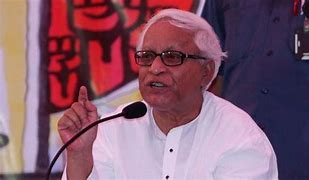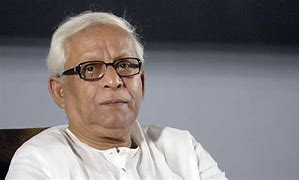Buddhadeb Bhattacharjee


The political landscape of West Bengal has been marked by profound loss with the passing of former Chief Minister Buddhadeb Bhattacharjee. At the age of 80, Bhattacharjee, a towering figure in Indian politics, has left behind a legacy that will be remembered for its significant impact on the state’s governance and political history. His death marks the end of an era and evokes a mixture of respect and reflection on his contributions to West Bengal and Indian politics as a whole.
A Brief Biography
Table of Contents
Early Life and Education:
Buddhadeb Bhattacharjee was born on March 1, 1944, in Kolkata (formerly Calcutta), West Bengal. His early life was marked by a strong inclination towards academics and social issues. He pursued his education at the Presidency College in Kolkata, where he earned his Bachelor’s degree in English Literature. His academic journey was complemented by a deep involvement in student politics, which set the stage for his future political career.
Political Rise:
Bhattacharjee’s entry into politics was fueled by his commitment to leftist ideologies. He joined the Communist Party of India (Marxist) (CPI(M)), a decision that would shape his entire political career. His early political work was characterized by activism and a focus on grassroots issues, which garnered him significant recognition within the party.
Political Career
Role in CPI(M):
Bhattacharjee’s rise within the CPI(M) was marked by his dedication to the party’s principles and his effective organizational skills. He held various positions within the party structure, which prepared him for his future roles in government. His leadership style and strategic acumen were instrumental in consolidating the party’s base in West Bengal.
- Economic Reforms:
- Industrialization Drive: Bhattacharjee’s tenure saw a significant push towards industrialization in West Bengal. His government made efforts to attract investments and revitalize the state’s economy, which had previously been marked by stagnation. Notable projects included the establishment of the IT hub in Salt Lake Sector V and the development of the Bengal Chemical and Pharmaceutical Works.
- Economic Policies: His government focused on modernizing infrastructure and promoting industry, although these policies also faced criticism for their impact on agriculture and rural areas. The balance between industrial growth and agricultural stability was a contentious issue during his tenure.
- Social Policies:
- Education and Health: Bhattacharjee’s administration made strides in improving education and healthcare facilities. Initiatives were launched to expand access to education, and there were efforts to enhance healthcare infrastructure in both urban and rural areas.
- Land Reforms: The land acquisition policies of Bhattacharjee’s government, particularly for industrial projects, were met with both support and opposition. While intended to boost economic development, these policies often led to conflicts with farmers and local communities.
- Political Challenges:
- Naxalite Insurgency: Bhattacharjee’s tenure was marked by ongoing challenges related to the Naxalite insurgency in rural areas. The government’s handling of this issue was often criticized for its heavy-handed approach.
- Public Perception: The later years of his tenure saw a decline in popularity, with increasing criticism regarding the perceived neglect of rural and agricultural issues.
Legacy and Impact
Economic and Social Contributions:
Buddhadeb Bhattacharjee’s contributions to the economic and social fabric of West Bengal are significant. His focus on industrialization and infrastructure development played a role in transforming the state’s economic landscape. While his policies were met with mixed reactions, there is no denying the impact they had on shaping the state’s trajectory.
Political Influence:
Bhattacharjee’s political career left an indelible mark on West Bengal’s political scene. His leadership during a transformative period for the state reflects the complexities of governance and the challenges of balancing development with social justice. His legacy is a subject of ongoing debate, reflecting both his achievements and the controversies that marked his tenure.
Personal Characteristics:
Known for his pragmatic approach and deep intellectual engagement with political issues, Bhattacharjee was respected for his commitment to his principles. His tenure was marked by a blend of progressive ideas and traditional leftist values, which shaped his policy decisions and political strategies.
Reactions to His Passing
Political Leaders and Public Figures:
The passing of Buddhadeb Bhattacharjee has prompted an outpouring of tributes from across the political spectrum. Leaders from various parties have expressed their condolences and acknowledged his contributions to West Bengal and Indian politics. Tributes highlight his role in shaping the state’s development and his commitment to public service.
Public Sentiment:
The public reaction to Bhattacharjee’s death reflects a mixture of respect and nostalgia. For many, he is remembered as a significant figure who played a key role in the state’s modern history. The reflections on his tenure often evoke discussions about the broader impacts of his policies and leadership.
Final Reflections
The passing of Buddhadeb Bhattacharjee marks the end of an influential chapter in West Bengal’s political history. His life and career embody the complexities and challenges of political leadership, reflecting both achievements and controversies. As West Bengal and India reflect on his legacy, Bhattacharjee’s contributions to governance, economic development, and social reform remain a testament to his impact on the state and the nation.
The legacy of Buddhadeb Bhattacharjee is a reminder of the enduring nature of political influence and the ways in which leaders shape and are shaped by their times. His passing is a moment for reflection on his contributions and the ongoing discourse about the role of politics in societal development.







